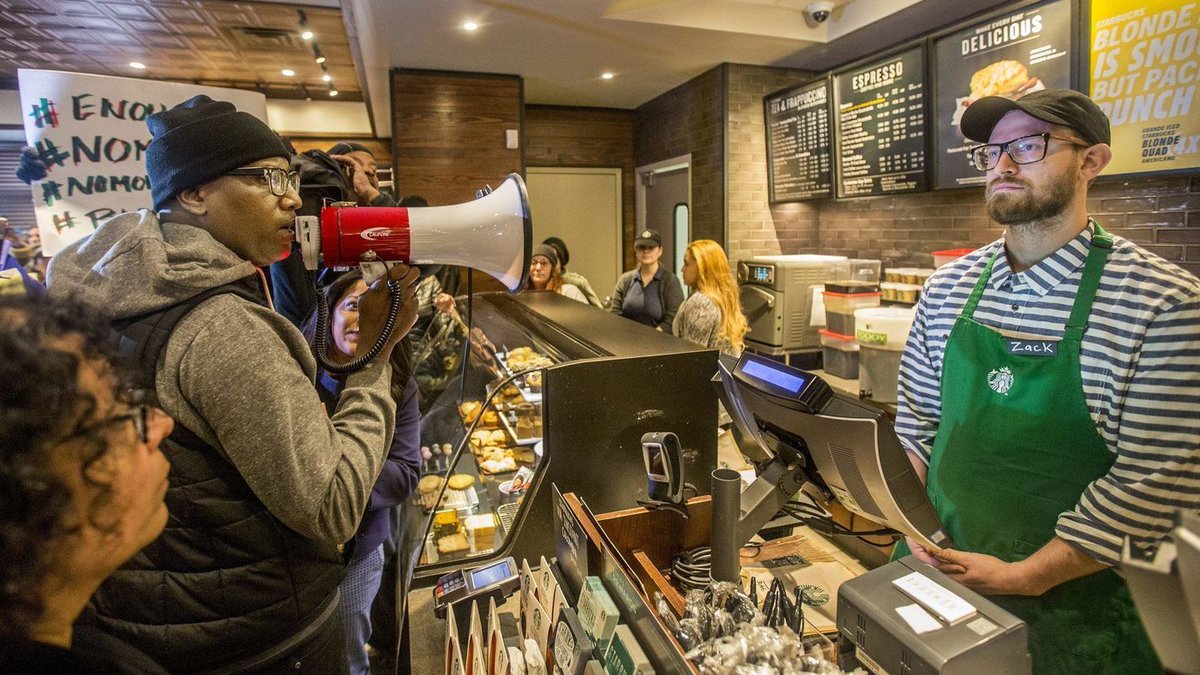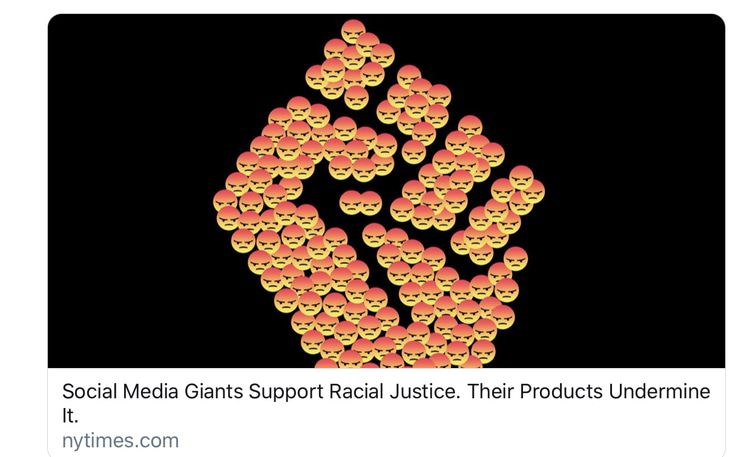

06/21/2020
From The New York Times news section:
Social Media Giants Support Racial Justice. Their Products Undermine It.
Shows of support from Facebook, Twitter and YouTube don’t address the way those platforms have been weaponized by racists and partisan provocateurs.
By Kevin Roose
Kevin Roose is a technology columnist for The Times . His column, “The Shift,” examines the intersection of technology, business, and culture. You can find him on Twitter, LinkedIn, Facebook, or Instagram. @kevinroose • Facebook
June 19, 2020Several weeks ago, as protests erupted across the nation in response to the police killing of George Floyd, Mark Zuckerberg wrote a long and heartfelt post on his Facebook page, denouncing racial bias and proclaiming that “black lives matter.” Mr. Zuckerberg, Facebook’s chief executive, also announced that the company would donate $10 million to racial justice organizations.
A similar show of support unfolded at Twitter, where the company changed its official Twitter bio to a Black Lives Matter tribute, and Jack Dorsey, the chief executive, pledged $3 million to an anti-racism organization started by Colin Kaepernick, the former N.F.L. quarterback.
YouTube joined the protests, too. Susan Wojcicki, its chief executive, wrote in a blog post that “we believe Black lives matter and we all need to do more to dismantle systemic racism.” YouTube also announced it would start a $100 million fund for black creators.
Pretty good for a bunch of supposedly heartless tech executives, right?
Well, sort of. The problem is that, while these shows of support were well intentioned, they didn’t address the way that these companies’ own products — Facebook, Twitter and YouTube — have been successfully weaponized by racists and partisan provocateurs, and are being used to undermine Black Lives Matter and other social justice movements….
But in recent years, a right-wing reactionary movement has turned the tide. Now, some of the loudest and most established voices on these platforms belong to conservative commentators and paid provocateurs whose aim is mocking and subverting social justice movements, rather than supporting them.
The result is a distorted view of the world that is at odds with actual public sentiment. A majority of Americans support Black Lives Matter, but you wouldn’t necessarily know it by scrolling through your social media feeds. …
Ms. [Candace] Owens is a serial offender, known for spreading misinformation and stirring up partisan rancor. (Her Twitter account was suspended this year after she encouraged her followers to violate stay-at-home orders, and Facebook has applied fact-checking labels to several of her posts.) But she can still insult the victims of police killings with impunity to her nearly four million followers on Facebook. So can other high-profile conservative commentators like Terrence K. Williams, Ben Shapiro and the Hodgetwins, all of whom have had anti-Black Lives Matter posts go viral over the past several weeks.
In all, seven of the 10 most-shared Facebook posts containing the phrase “Black Lives Matter” over the past month were critical of the movement, according to data from CrowdTangle, a Facebook-owned data platform.
… Twitter’s trending topics sidebar, which is often gamed by trolls looking to hijack online conversations, has filled up with inflammatory hashtags like #whitelivesmatter and #whiteoutwednesday, often as a result of coordinated campaigns by far-right extremists. …
In some ways, social media has helped Black Lives Matter simply by making it possible for victims of police violence to be heard. Without Facebook, Twitter and YouTube, we might never have seen the video of Mr. Floyd’s killing, or known the names of Breonna Taylor, Ahmaud Arbery or other victims of police brutality. Many of the protests being held around the country are being organized in Facebook groups and Twitter threads, and social media has been helpful in creating more accountability for the police.
But these platforms aren’t just megaphones. They’re also global, real-time contests for attention, and many of the experienced players have gotten good at provoking controversy by adopting exaggerated views. They understand that if the whole world is condemning Mr. Floyd’s killing, a post saying he deserved it will stand out. If the data suggests that black people are disproportionately targeted by police violence, they know that there’s likely a market for a video saying that white people are the real victims.
Here’s a picture of the only proper use of The Megaphone:
A couple of decades ago we had a utopian system on the Internet in which nobody monopolized crucial chokepoints on public debate. Who thought it was a good idea for a handful of rich people like Zuckerberg, Dorsey, and Wojcicki get vast power over free speech?
[Comment at Unz.com]This is a content archive of VDARE.com, which Letitia James forced off of the Internet using lawfare.